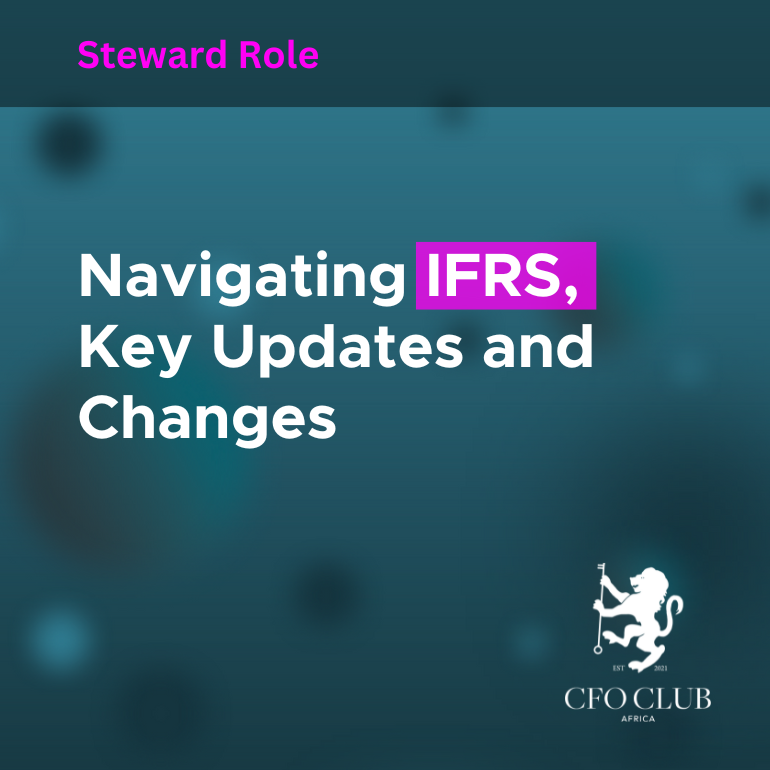Navigating IFRS, Key Updates and Changes
Introduction
In today’s fast-paced financial world, staying up to date with the latest International Financial Reporting Standards (IFRS) is critical for CFOs. As the financial leaders of organizations, CFOs in South Africa and across Africa need to ensure their accounting practices align with global standards. This article explores the most important IFRS updates and changes that CFOs should be aware of, with practical examples to help navigate these developments effectively.
IFRS 16 Leases: Impact on Balance Sheets
IFRS 16 has changed the way leases are recorded on balance sheets. In the past, many leases were kept off the balance sheet, but now, almost all leases must be recognised as assets and liabilities. This change significantly impacts financial metrics such as leverage ratios and EBITDA.
Practical Example: Consider a retail chain that leases multiple stores. Under the old rules, these lease payments might not have shown up on the balance sheet. With IFRS 16, the retailer now needs to record the leased stores as assets (right to use) and the lease obligations as liabilities. This change increases the company’s reported debt, potentially affecting its credit rating and investor perceptions. CFOs must ensure stakeholders understand this shift and its implications for financial statements.
IFRS 9 Financial Instruments: Managing Expected Credit Losses
IFRS 9 introduced the concept of expected credit losses (ECL), which means companies must recognise potential credit losses earlier, based on a forward-looking model. This is particularly important for sectors like banking, where managing credit risk is a key focus.
Practical Example: Imagine a bank that issues loans to customers. Previously, the bank would recognise losses only when there was evidence of default. Under IFRS 9, the bank must estimate and recognise potential losses as soon as the loan is made, considering various economic factors. If the economy shows signs of a downturn, the bank may need to increase its loss provisions, impacting its profits. CFOs need to ensure that their credit risk models are accurate and that they have systems in place to monitor these estimates regularly.
IFRS 15 Revenue from Contracts with Customers: Ensuring Compliance
IFRS 15 establishes a comprehensive framework for recognising revenue from contracts with customers. It requires companies to follow a five-step process to determine when and how much revenue should be recognised.
Practical Example: A software company sells a package that includes a software license, installation services, and ongoing support. Under IFRS 15, the company must break down the contract into these separate obligations. The software license might be recognised as revenue immediately upon delivery, but the installation and support services would be recognised over the period they are provided. This requires detailed analysis of contract terms and could change the timing of revenue recognition, affecting reported earnings. CFOs must ensure that all contracts are evaluated under this model and that revenue is recognised correctly.
IFRS 17 Insurance Contracts: Preparing for Implementation
IFRS 17, effective for annual reporting periods starting on or after January 1, 2023, introduces a new way of accounting for insurance contracts. It replaces the old IFRS 4 and requires a current measurement of future cash flows and the recognition of profits over the life of the contract.
Practical Example: Consider an insurance company that sells a 20-year life insurance policy. Under IFRS 17, the company needs to estimate all future payouts, adjust for risk, and recognise the profit gradually over the 20 years as the service is provided. If it becomes clear that the policy will result in a loss, the loss must be recognised immediately, not spread out over time. This means that CFOs need to have robust systems in place to measure these cash flows accurately and to adjust for any changes in risk or market conditions.
Key Features of IFRS 17:
- Measurement of Future Cash Flows and Profit Recognition: IFRS 17 requires insurance companies to measure future cash flows and recognise profits as they provide services. This approach ensures financial statements accurately reflect the timing and risk associated with insurance contracts.
- Separation of Insurance Service Results from Finance Income/Expenses: The standard requires that insurance service results, such as insurance revenue and service expenses, be reported separately from insurance finance income or expenses. This transparency helps stakeholders understand the true performance of insurance operations.
- Accounting Policy Choice: Companies can choose to recognise all insurance finance income or expenses in profit or loss or allocate some to other comprehensive income. This flexibility allows CFOs to align financial reporting with their company’s risk management strategy and communication with investors.
The Role of CFOs in Navigating IFRS Changes
CFOs play a vital role in ensuring their organisations stay compliant with IFRS while also leveraging these changes for strategic advantage. This requires staying informed about updates, proactively managing the implementation process, and effectively communicating the impact of these changes to stakeholders.
Practical Example: Suppose a CFO of a manufacturing company recognises that the new IFRS standards could alter the company’s reported earnings. By briefing investors early and explaining the impact clearly in financial reports, the CFO helps manage expectations and maintain investor confidence. This proactive communication is essential for mitigating any potential negative reactions to the changes in financial reporting.
Conclusion
The ongoing evolution of IFRS presents both challenges and opportunities for CFOs in South Africa and Africa. By keeping up with the latest updates and understanding their implications, CFOs can ensure their organisations remain compliant and continue to add strategic value. As the financial landscape becomes increasingly complex, the role of the CFO in navigating IFRS changes will become even more critical, requiring a blend of technical expertise, strategic thinking, and effective communication.

